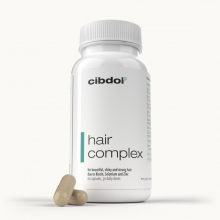What causes weak hair? And hair loss?
Published:
Have you noticed more hairs than usual accumulating in your hairbrush or shower drain? Is your ponytail looking a little thinner? If your locks seem to be losing their luster and fullness, your hair may be weakening. Read on to learn about the causes, signs, and solutions for weak, thinning hair.
Contents:
- What Causes Weak Hair That Breaks Easily?
- Signs Your Hair May Be Weak or Thinning
- How Can I Care for Weak, Thinning Hair?
- What Causes Weak, Thinning Hair Roots?
- How to Treat Weak, Thinning Hair Roots
- Maintain Healthy Hair and Roots with Proper Care
- Key Takeaways to Remember
- What are the signs of weak hair?
- What causes weak hair?
- How can I strengthen weak hair roots?
- What is the main cause of weak hair roots?
- What are the common causes of hair loss?
- How can I prevent hair loss?
- Can hair styling damage the hair?
- How can I keep my hair healthy?
- What type of hair care products should I use for weak hair?
- Can weak hair lead to hair loss?
Weak hair that is prone to excessive shedding and breakage can be alarming. However, in most cases, the problem can be corrected with the right hair care routine and treatment. With some simple lifestyle changes and targeted solutions, you can nourish your hair follicles, stimulate growth, and restore strength and thickness to your tresses.

What Causes Weak Hair That Breaks Easily?
There are many factors that can cause hair to become thin, brittle and weak. Understanding what leads to weakened locks can help you pinpoint solutions tailored to your unique situation. Some common culprits include:
Hormonal Changes
Fluctuations in androgens and estrogen that occur during puberty, pregnancy, and menopause can trigger hair follicles to shrink, resulting in thinning hair strands that are more prone to breakage.
Nutritional Deficiencies
Lack of protein, iron, zinc, vitamin B12, and other nutrients essential for robust hair growth can cause strands to become brittle and snap.
Medical Conditions
Issues like thyroid disorders, autoimmune diseases, and diabetes can disrupt the hair growth cycle and cause excessive shedding and fragility.
Medications
Certain prescription drugs used to treat conditions like depression, heart disease, arthritis, and cancer may list hair loss or thinning as a side effect.
Stress
High stress levels disrupt hormones and nutrients that support strong hair. This can cause more hairs than normal to prematurely enter the “resting” phase of the growth cycle before they reach their full length and thickness.
Heat Styling
Frequent use of hot tools like blow dryers, flat irons, and curling wands can damage hair proteins leading to dry, weak strands that easily break.
Harsh Chemicals
Overprocessing hair with bleach, relaxers, perms, and dye can strip away natural oils and weaken the integrity of the hair shaft over time.
Environmental Factors
Pollution, hard water minerals, chlorine, and sun exposure can lead to dryness, damage, and weathering that diminishes hair strength.
Signs Your Hair May Be Weak or Thinning
Some common red flags that your hair may be losing strength and density include:
- More hair accumulation in your brush and shower drain
- Visibly thinner ponytail circumference
- Wider part line and more scalp becoming visible
- Hair that feels brittle and snap when brushed
- Locks that seem to lack their previous shine and luster
- Split ends cropping up more frequently
If you notice multiple signs of weakening hair, it’s a good idea to evaluate your hair care routine and make adjustments to shore up hair health. The sooner you identify and address what’s causing your hair to thin, the more success you’ll have restoring thickness and vitality.
How Can I Care for Weak, Thinning Hair?
Caring for fragile, thinning hair requires a gentle touch along with targeted treatments. Here are some tips for nourishing weak locks back to health:
Go Easy on Styling
Limit use of hot tools and hair dye while your hair regains its strength. Allow hair to air dry when possible and always apply heat protectant if using hot tools.
Condition Liberally
Hydrate parched strands with a moisturizing conditioner after every shampoo. Apply conditioner from roots to ends, wait 5 minutes before rinsing for maximum penetration.
Handle Gently
Use a wide tooth comb and detangle hair starting from the bottom, working upwards to avoid snapping fragile strands. Pat dry with a soft towel or microfiber cloth.
Protect Your Strands
Shield hair from sun, wind, and environmental damage by wearing a hat or silk scarf when outdoors. Tie hair back to avoid tangling and breakage.
Stimulate Your Scalp
Massage scalp with fingertips for 5-10 minutes daily to increase circulation and stimulate the follicles for stronger new growth.
Eat a Hair Healthy Diet
Make sure to get sufficient protein, iron, zinc, vitamins A, C, and Bs to nourish hair follicles and promote robust new growth.
Take Supplements
Biotin, vitamin D, fish oil, and collagen supplements support thicker, faster hair growth and strengthen the hair shaft. Ask your doctor for recommendations.
Use Targeted Treatments
Products containing proteins, peptides, biotin, caffeine, saw palmetto, and argan oil can help fortify weak hair. Rotating treatments keeps follicles responsive.
What Causes Weak, Thinning Hair Roots?
While many factors can make hair prone to thinning and breakage, weak hair roots are often the underlying cause. Hair follicles go through growth cycles where they regenerate, grow, rest, and shed. Healthy roots anchor each strand firmly at the scalp. When roots are weakened, hair is more likely to prematurely shed or break. Common causes include:
- Hormonal fluctuations
- Nutrient deficiencies
- High stress levels
- Scalp conditions like dandruff
- Medications
- Aging and genetic factors
- Damage from chemical processing and heat styling
Infection, inflammation, and oxidative damage can all negatively impact the cells in hair follicles. As damage accumulates over successive growth cycles, the follicles shrink and produce thinner, wispier strands.
How to Treat Weak, Thinning Hair Roots
Treatment for weak hair roots should aim to reduce damage and create optimal conditions for regrowth. Some strategies include:
Gentle Scalp Massage
Rubbing the scalp with gentle pressure increases blood flow to stimulate activity in hair follicles. It also helps remove follicular buildup.
Scalp Cleansers
Use a clarifying shampoo once a week to dissolve dirt, oil, and product residue that can clog and inflame hair follicles.
Red Light Therapy
Exposing the scalp to red light photons can energize hair follicle cells and prolong the active growth phase. At-home devices are available.
Nutrient Optimization
Getting sufficient protein, vitamins A, B, C, D, and minerals like iron, zinc and selenium nourishes hair root cells and the dermal papilla for optimal growth.
Stress Management
High cortisol from chronic stress impairs follicle growth. Relaxation practices like yoga, meditation, and massage can aid growth.
Topical Treatments
Serums with peptides, biotin, coconut oil, ginseng, saw palmetto, caffeine, and green tea applied to the scalp can strengthen roots.
Medicated Shampoos
Shampoos containing ketoconazole and salicylic acid help eliminate fungus or inflammation in hair follicles that stunts growth.
Platelet Rich Plasma
PRP therapy injects nutrient-rich plasma from your own blood into the scalp to stimulate follicles. Multiple sessions are needed.
Maintain Healthy Hair and Roots with Proper Care
While some hair loss and thinning is genetic or related to age, much of it is preventable. Giving your locks attentive care keeps roots robust and strands strong. Here are some tips:
- Shampoo less frequently, only 2-3 times per week to avoid drying out the scalp
- Alternate between cool and warm water, as hot temperatures can damage roots
- Pat dry hair instead of rubbing to prevent tangles and breakage
- Avoid tight hairstyles that pull on the roots leading to trauma and hair loss
- Use smooth clips and scrunchies instead of rubber bands which break hair
- Wear hair loose whenever possible to relax follicles and increase circulation
- Always use heat protectant spray before hot tools to shield vulnerable roots
- Get regular trims to prune away split ends and allow healthier new growth
- Let hair down to "rest" overnight instead of sleeping in a tight bun or braid
With a nourishing hair care regimen and remedies targeted to your unique situation, you can get thinning hair and weak roots back to a state of vibrant health and strength. Be patient and gently persistent to allow time for damaged follicles to regenerate during their growth cycles. With the right solutions, you'll see your hair return to its former luster and fullness.
Key Takeaways to Remember
- Weak, thinning hair is often caused by issues like stress, hormones, scalp conditions, and damage from styling. Treating the underlying problem is key.
- Be extra gentle while brushing and handling fragile hair prone to breakage. Limit heat styling and chemical processing.
- Deep condition regularly and protect locks from sun damage to prevent dryness and breakage.
- Weak hair roots are a common cause of weak, thinning hair. Focus on scalp health to nourish follicles.
- Massage, light therapy and topical treatments can energize and strengthen overworked hair follicles.
- Eat nutrient-rich diet, take supplements, and manage stress to support optimal hair growth cycles.
- With time, a consistent hair care routine tailored to your needs can strengthen roots for renewed thickness and shine.
What are the signs of weak hair?
Signs of weak hair include hair breakage, excessive hair fall, hair thinning, and brittle hair.
What causes weak hair?
Weak hair can be caused by various factors including excessive hairstyling, using harsh chemical hair care products, not getting enough nutrients in the diet, and hormonal imbalances.
How can I strengthen weak hair roots?
To strengthen weak hair roots, it is important to follow a good hair care routine that includes using the right hair care products, avoiding excessive heat styling, and nourishing the hair with proper nutrition.
What is the main cause of weak hair roots?
Weak hair roots can be caused by a combination of factors such as hormonal imbalances, nutritional deficiencies, excessive chemical treatments, and genetic factors.
What are the common causes of hair loss?
Hair loss can be caused by factors such as genetics, hormonal imbalances, certain medical conditions, excessive hairstyling, and nutritional deficiencies.
How can I prevent hair loss?
You can prevent hair loss by maintaining a healthy diet, avoiding excessive heat styling and chemical treatments, managing stress levels, and using hair care products specifically designed to promote hair growth and strengthen the hair.
Can hair styling damage the hair?
Yes, excessive heat styling, tight hairstyles, and using harsh chemical hair products can damage the hair and weaken the hair strands, leading to hair loss.
How can I keep my hair healthy?
To keep your hair healthy, it is important to follow a good hair care routine, including regular washing with a mild shampoo, conditioning the hair, avoiding excessive heat styling, protecting the hair from sun and environmental damage, and eating a balanced diet rich in vitamins and minerals.
What type of hair care products should I use for weak hair?
It is recommended to use hair care products specifically formulated for weak or damaged hair. Look for products that contain nourishing ingredients such as vitamins, proteins, and natural oils.
Can weak hair lead to hair loss?
Yes, weak hair that is prone to breakage and hair loss can be a result of various underlying causes such as nutritional deficiencies, hormonal imbalances, and excessive hairstyling. Taking care of weak hair and addressing the underlying causes can help prevent further hair loss.










